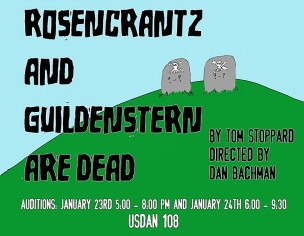
I’ve been involved in theater since middle school, but I didn’t love it until I came here. During my freshman year, I started to see all of the creative freedom and versatility that theater had to offer. Then I realized that I had to at least try and direct something through Second Stage.
So, right now, as I am writing this, I am.
I spent the last year talking to, working with, and studying the work of many different directors, all of them far better than I. It is still ongoing, and I’m beginning to grasp how space can be manipulated, how to make a scene interesting, what’s too much and what’s not enough. There was (and still is) so much to learn, but it was time to give it a go regardless.
At the end of spring semester my freshman year I saw a short, experimental production of “Where the Wild Things Are.” Much of the action took place on the top of Indian Hill Cemetery. The hill is absolutely gorgeous, impossibly green, surrounded by trees, but it is also surrounded by death. There was a resonance to this that that I felt deeply while I was watching this production. I could do more with this.
Having meditated on this for months, I had a plan. I had chosen a play, one of my all-time favorites, Tom Stoppard’s “Rosencrantz and Guildenstern are Dead.” I paired down a 12-person cast to be shared between four actors; two as the titular underwritten Hamlet characters, two as the Players that perform the world around them. I had a thorough plan, I was excited, and I was ready, but I was also competing with a great many productions, many with more experienced teams.
When it was time for auditions, I did not get a huge showing of actors to read for the parts. The actors who did audition, however, were very good, and I began to see the show coming together. Despite many actors who I called back dropping out, I ended up with an excellent cast, and rehearsals began in earnest. I began focusing on my two Players, who play nine different parts over the course of the show, working with them to occupy the physical and vocal spaces of many different people to quell what confusion their multi-casting would cause, which was a roaring success.
But then I hit a snag. One of my actors, struggling with lines and his own schedule, dropped out. Ze was one of my leads. Hir desire to leave was understandable given the pressure of this campus, but still I was terrified. My stage manager, Hazem Fahmy ’17, talked me down from my fear, and we sat down and gathered people to read for us. Within 24 hours, we had a new actor, and the show went on.
Having a full cast again, it was time to begin blocking the show—systematically rehearsing it, scene-by-scene, until everyone knew what they should do and where they were supposed to be. And blocking was great. My actors would run a scene, based on preliminary comments and their own instincts, we’d stop, I’d ask for something to change, be it a motion, an intonation, or a reaction. Then we’d run it again. I’ve never had more fun working on a show. Having a group of people invested in my interpretation of a huge, strange, script is as humbling as it is ego-inflating.
As of Tuesday, April 14, all of the show has been blocked. There are only a few weeks left until “Rosencrantz and Guildenstern are Dead” is brought to Indian Hill, on May 1, 2, and 3. We still have a lot of work left to do. It is going to be challenging, it will be mentally and physically exhausting, and I expect at least one more crisis, but I know that come the beginning of May, surrounded by graves and grass, there will be a show. And that’s pretty exciting.


Leave a Reply